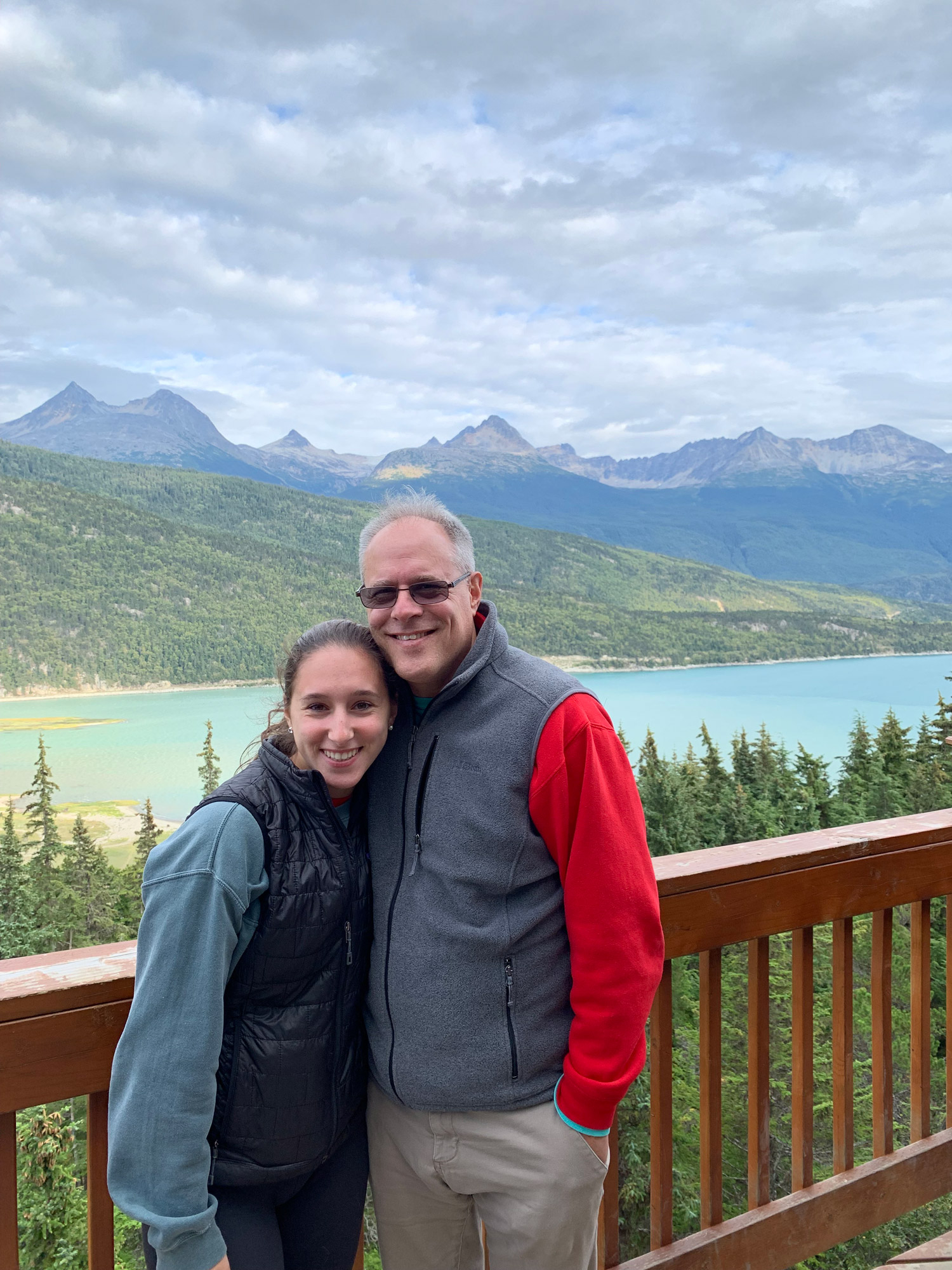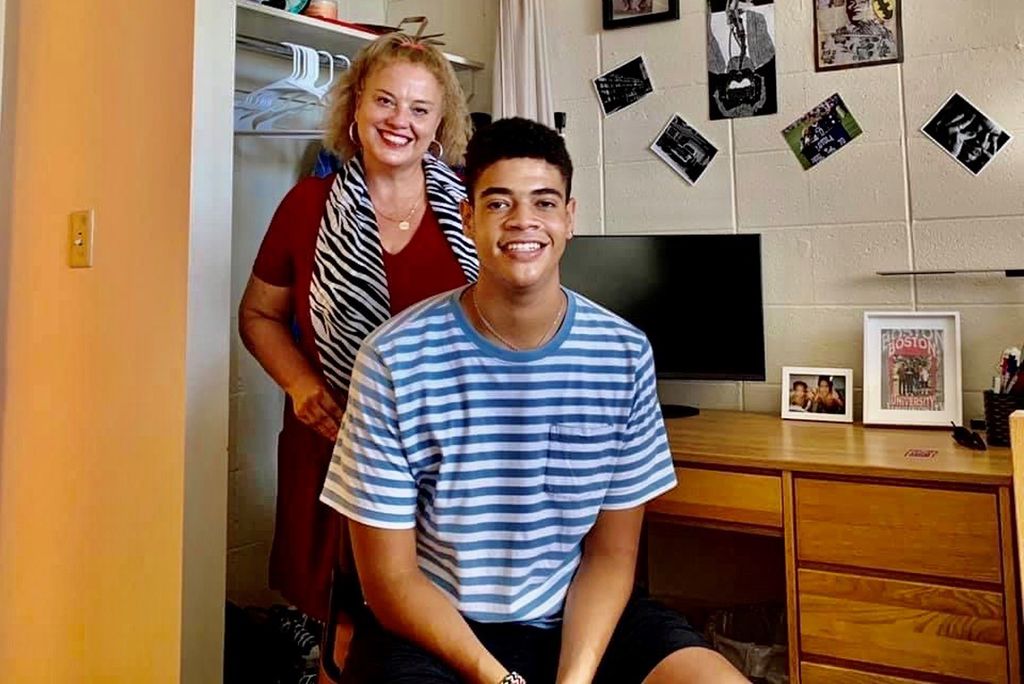As Other States Grapple with COVID-19 Surges, Parents of Returning Terriers Sleep Easier Knowing BU’s Safety Precautions

Pre-pandemic, Gary Gelfman and his daughter Tamara (Sargent’21) savored Alaska’s beauty; today, the San Diego resident is happy she’s returned to campus in Boston. Photo courtesy Gary Gelfman
Parents of Returning Students Confident, Comfortable with BU’s Precautions
Those in surge states say their children are safer at the University than at home
- Parents of on-campus students reassured by BU’s COVID-19 protocols
- Students from surge states are safer in Boston, their parents say
- University’s consistent safety messaging also praised
Unlike last year, AJ Pratt didn’t help her son Jared (Sargent’23) move into his Boston University dorm room this semester. It was difficult, she says, to get a COVID-19 test in time to avoid the Massachusetts mandatory quarantine for most out-of-staters overnighting in the commonwealth. Jared would be flying east and moving into Kilachand Hall solo this year.
So over dinner the night before he left, she made a point to go over any anxieties he might have: other people not wearing masks, the airline not enforcing safety precautions. Turns out that Jared’s one worry was whether his mom would insist for safety’s sake that he study from home under BU’s Learn from Anywhere option. He’d had his fill last spring, thank you, of exams at 5 am during remote study because of the Arizona-Massachusetts time difference. Front and center also was the other significant difference between the states: Massachusetts has wrestled down its virus rate, while Arizona staggers under a runaway surge.
“For us, it was a no-brainer decision,” says Pratt, a pediatric physical therapist who works with families that have lost adults to COVID-19. “Yeah, you’re nervous, you don’t know how things are going to be. But I believe he’s safer there than he is back here.”
Families with students on campus are a self-selected group, their children returning by choice under LfA. Many parents interviewed by BU Today are as comfortable as Pratt with that choice, especially those from places being hammered by the coronavirus.
Living outside San Diego, which like Arizona has been hard hit by COVID-19, Gary Gelfman sleeps easier with his daughter Tamara (Sargent’21) in Boston. “This is her final year,” he says. “She’s 21 years old; she needs to be in college. She loves the University.”
A lightweight rower, Tamara will be able to practice with her team this fall, partly because, outside the boat, it’s easy to socially distance on a river, and partly because in the boat, head coach Malcolm Doldron “has put together an unbelievable program in trying to follow all the health guidelines,” Gelfman says.
“They’re going to be rowing in a bunch of singles; they’re going to be only in groups of, I think, 10 at the most; he’s arranging them by their living groups, Gelfman adds, to minimize contacts. “The detail that has gone into what he has done is amazing.”
BU’s safety precautions were balm for Ilda Jiménez’s concerns when she deferred to her son Ea’sus Jiménez y West (ENG’23), who elected to leave their Los Angeles home for campus. “The lesson in this situation for me,” says Jiménez, a project manager at the University of Southern California, “is continuing to learn how to let go and know that my son can be responsible enough to make the right decisions whether I am around him or not.”

Still, their goodbye wasn’t marked by a longer hug or a motherly demand for more frequent calls home, she says. “The rigorous safety protocols actually make me feel less anxious about my son being on campus,” she says. “In a bizarre way, such a stringent safety regimen sends a clear message to my son and I that we need to do what we can to control the spread of the virus while still trying to maintain some normality to our lives.”
These mothers and fathers are not perturbed by experiences at other campuses, like the University of North Carolina at Chapel Hill, that have abandoned in-person instruction this fall following an immediate COVID-19 surge.
“I pulled up UNC’s [precautions plan], and it’s crud,” Pratt says. “They did not test kids when they came back on campus, and they were only doing testing if students had symptoms,” when many students might be asymptomatic yet still have the virus. (The Centers for Disease Control and Prevention has been criticized for confusing advice on that score.) “They didn’t do what BU’s doing. BU is really doing an awesome job with the surveillance testing, and I really do think that’s going to be the key to these kids being able to stay.”
The parents also applaud what they call the University’s consistent safety messaging, from coaches to the clear-cut vow by Kenneth Elmore (Wheelock’87), associate provost and dean of students, to suspend students who violate Massachusetts’ ban on gatherings exceeding 25 people.
“The University has drilled it in their heads,” Gelfman says. “And I loved the letter that Dean Elmore sent. I have no problem with it. My daughter doesn’t have a problem with it. In their team, that’s all they talk about, we’ve got to do this right. We want to be here [for] our season” come spring.
He’s safer at BU than he is in Arizona.
And there’s no generation gap when it comes to his admiration for the student safety campaign with the head-turning title F*ck It Won’t Cut It. “It’s brilliant,” he says.
Pratt likens Elmore’s suspension warning to the excuse she suggested her son use when he was in high school for ducking risky partying: “Blame it on mom. My mom’s crazy and she’s going to make my life miserable.” With COVID-19 and congregating, she told Jared, “BU’s giving you guys the same out, the same big shoulder, to be able to push back against friends who may give you peer pressure, to say it’s not worth being kicked out.”
“I know there are worries and a lot of people saying, ‘They’re young adults, they don’t always think things through, they’re going to want to party,’” Pratt says. “I don’t think that’s the way the majority of the BU students think about things. I think they want to follow the rules, I think they want to be successful and continue their education and be able to stay there.”
Gelfman says that his wife has described what BU is doing as “basically one big petri dish experiment.” But he is remaining optimistic. “We have a lot of friends in public health. Boston University is doing exactly what public health has told our president to be doing since March and April—test as often as you can, socially distance.”
And if the students do that, Gelfman says, they will have a memorable school year: “These kids are resilient, and they’re going to have a story to tell. One for the history books.”

Comments & Discussion
Boston University moderates comments to facilitate an informed, substantive, civil conversation. Abusive, profane, self-promotional, misleading, incoherent or off-topic comments will be rejected. Moderators are staffed during regular business hours (EST) and can only accept comments written in English. Statistics or facts must include a citation or a link to the citation.